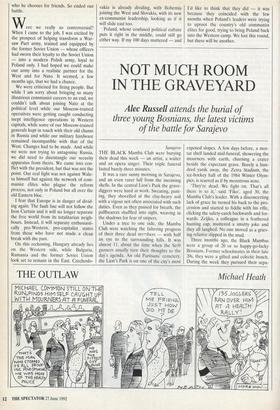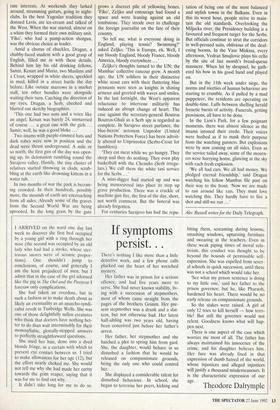NOT MUCH ROOM IN THE GRAVEYARD
Alec Russell attends the burial of
three young Bosnians, the latest victims of the battle for Sarajevo
Sarajevo THE BLACK Mamba Club were burying their dead this week — an artist, a waiter and an opera singer. Their triple funeral lasted barely three minutes.
It was a rare sunny morning in Sarajevo, and an even rarer lull from the incoming shells. In the central Lion's Park the grave- diggers were hard at work. Sweating, pant- ing, they shovelled at the clay-heavy soil with a vigour not often associated with such duties. Even as they paused for breath, the pallbearers shuffled into sight, weaving in the shadows for fear of snipers.
Under a tree to one side, the Mamba Club were watching the faltering progress of their three dead members — with half an eye to the surrounding hills. It was almost 11, about the time when the Serb gunners usually turn their thoughts to the day's agenda. An old Partisans' cemetery, the Lion's Park is on one of the city's most exposed slopes. A few days before, a mor- tar shell landed mid-funeral, showering the mourners with earth, churning a crater beside the expectant grave. Barely a hun- dred yards away, the Zetra Stadium, the ice-hockey hall of the 1984 Winter Olym- pics, is scarred as if by monstrous acne.
`They're dead. We fight on. That's all there is to it,' said `Fiko', aged 30, the Mamba Club's leader. With a disconcerting lack of grace he turned his back to the pro- cession and started to fiddle with his rifle, clicking the safety-catch backwards and for- wards. Zeljko, a colleague in a feathered hunting cap, muttered a smutty joke and they all laughed. No one moved as a griev- ing relative slipped in the mud.
Three months ago, the Black Mambas were a group of 20 or so happy-go-lucky Bosnians. Former schoolmates in their late 20s, they were a gifted and eclectic bunch. During the week they pursued their sepa- rate interests. At weekends they larked around, strumming guitars, going to night- clubs. In the best Yugoslav tradition they donned Levis, ate ice-cream and talked of the West. When the war started, almost on a whim they formed their own military unit. 'Fiko', who had a pump-action shotgun, was the obvious choice as leader.
Amid a chorus of chuckles, Dragan, a chubby-faced student with a good grasp of English, filled me in with these details. Behind him lay his old drinking fellows, Samir, Kenan and Mario, two Muslims and a Croat, wrapped in white sheets, speckled in mud, killed in a street battle the day before. Like outsize marrows in a market stall, ten other bundles were alongside waiting their turn. Catching the direction of my eyes, Dragan, a Serb, checked and blurted out sketchy biographies.
'This one had two sons and a voice like an angel. Kenan was barely 24, unmarried of course ... a great one with the girls ... Samir, well, he was a good bloke ' Two imams with purple-rimmed hats and dark robes were now in position and the dead were thrust underground. A mile or so north, the first gun of the day was open- ing up, its detonation rumbling round the Sarajevo valley. Hastily, the tiny cluster of relatives started throwing in clods, scrab- bling at the earth like drowning kittens in a water tub.
In two months of war the park is becom- ing crowded. In their hundreds, possibly more, the mounds of earth are encroaching from all sides. Already some of the graves from the Second World War are being uprooted. In the long grass by the gate grows a discreet pile of yellowing bones. 'Fiko', Zeljko and entourage had found a space and were leaning against an old tombstone. They strode over to challenge the foreign journalist on the fate of their country.
'So tell me, what is everyone doing in England, playing tennis? Swimming?' asked Zeljko. 'This is Europe, eh. Well, I say bloody England, bloody France, bloody America, bloody everywhere ...'
Zeljko's thoughts turned to the UN; the Mambas' collective rancour grew. A month ago, the UN soldiers in their distinctive white scout cars with their fluttering blue pennants were seen as knights in shining armour and greeted with waves and smiles. In the last fortnight, the West's apparent reluctance to intervene militarily has induced an abrupt change of heart. The case against the secretary-general Boutros Boutros-Ghali as a Serb spy is regarded as complete. In Sarajevo street parlance, the blue-berets' acronym Unprofor (United Nations Protection Force) has been adroit- ly altered to Unprisrofor (Serbo-Croat for bumblers).
'They eat meat while we go hungry. They sleep and they do nothing. They even play basketball with the Chetniks (Serb irregu- lars.) We call them the white taxi service for the Serbs ... '
A mini-digger had started up and was being manoeuvred into place to step up grave production. There was a crackle of machine-gun fire, the first of the day, short, not worth comment. But the funeral was already forgotten.
For centuries Sarajevo has had the repu- tation of being one of the most balanced and stylish towns in the Balkans. Even in this its worst hour, people strive to main- tain the old standards. Overlooking the Miljacka river, the Presidency building is a favoured and frequent target for the Serbs. But officials-continue to strut the corridors in well-pressed suits, oblivious of the deaf- ening booms. In the Vase Miskina, every afternoon, Vedran Smajlovic plays his cello by the site of last month's bread-queue massacre. When hit by shrapnel, he gath- ered his bow in his good hand and played on.
But in the 11th week under siege, the norms and niceties of human behaviour are starting to crumble. As if pulled by a mad puppeteer, the residents are operating on double-time. Lulls between shelling herald frenetic bursts of activity. Funerals, getting provisions, all have to be done.
In the Lion's Park, for a few poignant moments, there was almost silence as the imams intoned their credo. Their voices were hushed as if to mask their purpose from the watching gunners. But explosions were by now coming on all sides. Even as the service tailed away, some of the mourn- ers were hurrying home, glancing at the sky with each fresh explosion.
'We all had cars. We all had money. We pledged eternal friendship,' said Dragan watching his fellow Mambas file past on their way to the front. 'Now we are made to run around like rats. They must love watching this. They hardly have to fire a shot and still we run ...'
Alec Russell writes for the Daily Telegraph.



















































 Previous page
Previous page